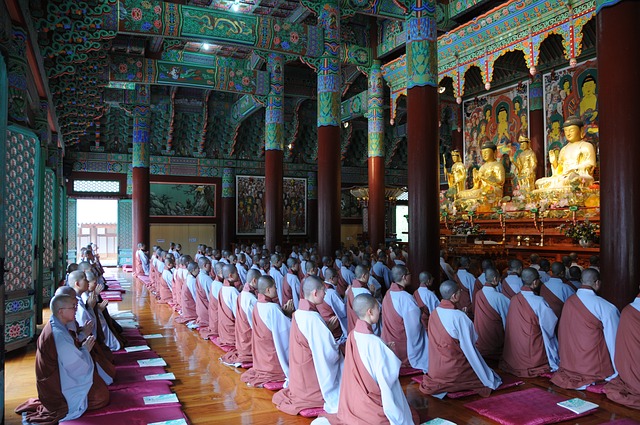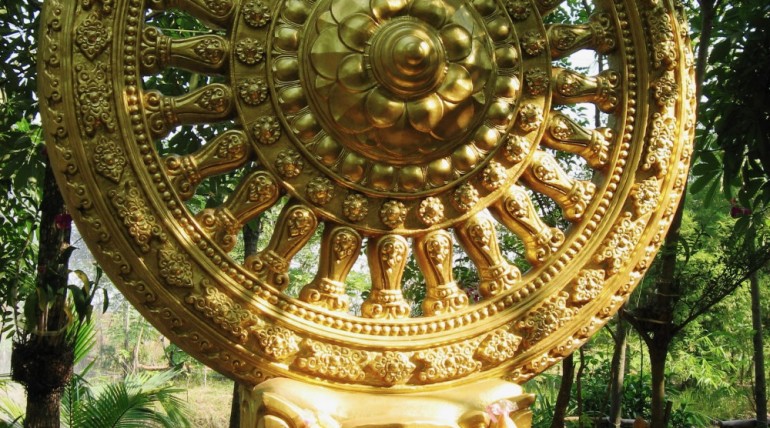Khanti parami, or the perfection of patience, is the sixth of the ten paramis. In Buddhist literature, khanti is described as forbearance, tolerance, and forgiveness. While practising the perfection of tolerance, one endures hardship and suffering that one experiences in life. It includes experiences in meditation – such as bodily discomfort, noise, and distraction, the feelings of heat and cold. All these are completely normal in our practice and we must learn to endure them.
If we cannot endure the discomfort and distraction, we will not develop concentration. If we have no concentration (samadhi), it is not possible to gain insight (panna) into the true nature of everything.
The Purpose of Practising Khanti
Tolerance can also be practised when we meet difficult people that hurt us through their speech, and behaviour. We should try not to react to it with anger, hatred, or resentment.
In the Sabbasava Sutta of the Majjhima Nikaya, the Buddha described tolerance as one of the seven methods to eradicate mental defilements (asava) that can arise from within or from external sources. Khanti as perfection has to be practised with compassion for other beings without expecting gains either in this life or in future lives. We should only have the intention to eliminate defilements and attain enlightenment and liberation from samsara – the cycle of birth and death.
Understanding the Importance of Patience
Patience is so important that it was taught by the Buddha in the Ovada Patimokkha, the first teaching of the Buddha. “Patience, endurance is the ultimate asceticism.” During the time of the Buddha, ascetics striving for the goal of enlightenment thought it can only be attained by practising severe asceticism and bringing a lot of pain to the body like depriving the body of food and sleep.
That’s why the Buddha said that patience is the ultimate asceticism that really helps us overcome our defilements.
At a later time, the Buddha while residing at the Jetavana monastery said to Ananda, who asked him what is the most important thing for a monk to practise? The Buddha shared, “Khanti paramam tapo titikkha” – the best ethical practice is khanti.
Why are we Impatient?
People, things, and situations are not the way we would like them to be. This creates impatience and aversion. We have to accept that others have faults and flaws as we do and have patience with them and with ourselves.
We like to think that people should be like this or that, but that is clearly not real. Everyone has these thoughts, so we need to have tolerance and patience. For most of our lives, we are driven by things we want to attain or to do. Being patient and present in the here and now, even when things are chaotic around us, is much more precious.
Impatience Brings Bad Results
A very good story to share is that of Ajahn Chah, a famous Thai meditation teacher who passed away 30 years ago and who had many Western disciples who are well-known and teaching now. Ajahn Chah always told his students that when he was a boy of five years , his father gave him a handful of seeds for planting. He was very excited. He took the seeds, put them in the earth, and watered them. But when nothing happened, he came to his father complaining about it.. His father told him to be patient and let the sun and water do their work.
The young Ajahn Chah watered his plants twice a day. Soon, some sprouts appeared and he was very excited. He watered them thrice a day, but they didn’t grow fast enough. So, he pulled the plants to make them grow faster but ended up killing all of them.
Patience on the Spiritual Path
Having patience on the spiritual path is important. I have been living in temples for 32 years. In the first few years, I wanted to attain enlightenment very fast. I thought that it had to happen now. Just contemplate how long Gotama Buddha took to attain Buddhahood. They said it’s four kalpas and one hundred eons of time, which is an unimaginable amount of time.
To give you an idea – one kalpa can be compared to the tallest mountain in the Himalayas and every 100 years, a bird with a silken shawl flies over that mountain with the silk touching the mountain. Until the touch of the silk completely wears down that mountain, then one kalpa has passed.
In Taoism, there is a story explaining impatience on the path to enlightenment. A student asked his master how long it would take to reach enlightenment. The master answered, “Ten years.” The student asked, “What if I practice really hard?” The master then answered, “Twenty years.” The student retorted, “What if I put everything into my practice, then it will be faster?” The teacher answered, “You will need thirty years.”
We practice and walk our way without waiting for the result. Results will come when the time is ripe. It is not relevant when we will reach the goal but it is important for us to walk the path.
Anger and Patience
If we have patience, we usually don’t react to the anger. We refrain from speaking or acting in anger. Khanti helps us to avoid any negative karma which can have its results in the future. In modern psychology, it is said we should let out our anger.
I don’t think that is good advice. We are just a bundle of habits and whatever we do often, creates new habits. For example, we act upon our anger and it becomes our deeper habit because we add fuel to the fire.
Patience is not suppression; it helps us look at the cause. It helps us see the consequences of anger. Anger can cause physical problems. We can’t sleep, because we keep thinking of what makes us angry. Some people get ulcers, strokes, heart attacks, or blood clots. So many things can happen when we are angry, it is not helpful at all – not for ourselves or others.
If you look at the mirror when you are angry, you can see you don’t look very good. Patience replaces anger. Our mind only has space for one thing at a time. When we have patience, we cut off anger. Enemies can be our spiritual friends too because they help us practise patience.
Overcoming the Four Lokadhamma with Patience
Patience helps us overcome the four worldly dhamma (lokadhamma), which come in four pairs. They are gain and loss, fame and obscurity, praise and blame, happiness and suffering. We have to deal with these in our lives very often. With patience, we can be with them and accept them as they arise, and cease without getting angry or frustrated if things don’t go our way.
Patience can give us more freedom in our lives



